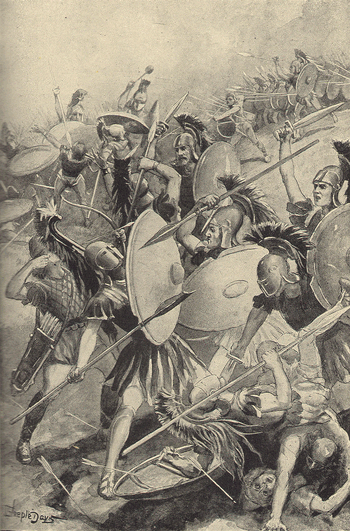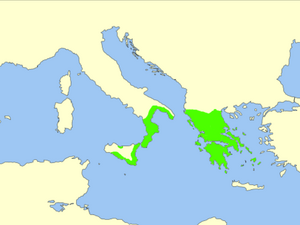
The Greco-Persian Wars
The Persians invaded Greece in 480, in OTL they were defeated, and Greece remained divided, eventually leading to the Peloponnesian War, which eventually lead to Rome conquering Greece. But what would have happened if after the Persian invasion, the Greeks stayed united and eventually Hellenism becomes a dominant force in the world.
Persian Invasion[]
The Persian invaded mainland Greece in 480 B.C.E, where they were confronted by a large army of Greek soldiers from all over the city-states of Greece. The Persians advanced by land from Macedon, and they were met by Greeks every step of the way. At the Battle of Thermopylae in September 480 B.C.E., the Spartans, lead by Leonidas were defeated, but their last stand allowed their other allies to live to fight another day. Meanwhile, the Greek victory at Salamis established Greece as the dominant naval power in the war.
But as the Persians marched on Athens, they were defeated at the Battle of Thebes, where a combined Greek army of 50,000 Greek soldiers defeated 300,000 Persians, forcing them to retreat and were continuously followed by the Greeks until they were forced out of Greece and back to Thrace, where a naval and land siege soon forced the surrender of Byzantium. The Greeks had now won their war against the Persians but continued to fight them in support of the Ionian rebels on the eastern Anatolian.
Greece United[]
With Persia defeated and the Greeks victorious, the Greeks had proven that as a united power, Greece was capable of any task, and this put an idea in the minds of many of the Greek leaders. If the Persians invaded again, a divided Greece stood little of a chance, but one unified Greece would certainly win. The Conference of

The Conference of Athens in 475 B.C.
Athens in 475 B.C.E., the Greek leaders, Themistocles of Athens, Pleistarchus and Leotuchidas of Sparta, as well as the kings of Thebes, the king of Delphi, and the rulers of multiple other smaller Greek states vassals to the Athenians and Sparta. They agreed to the creation of a single Greek country lead by a single Greek Senate with representatives all of the city states in the new Greek nations. The establishment of the Council of Kings was also agreed on as a council of the Greek kings to be the military leaders of the Greek armed forces, made up of the combined Greek armies and navies. The Greeks decided on Athens as the political capital because of its established infrastructure and strategic position, Sparta as the military capital because of its history as a military base, and Corinth as the economic capital based on its position on the Corinthian Isthmus. Now with an army of 100,000 total soldiers, and a navy of 450 triremes, Greece was a force to be reckoned with.

The New Republic of Greece, 475 BCE
Nations[]
Greece
Persia
